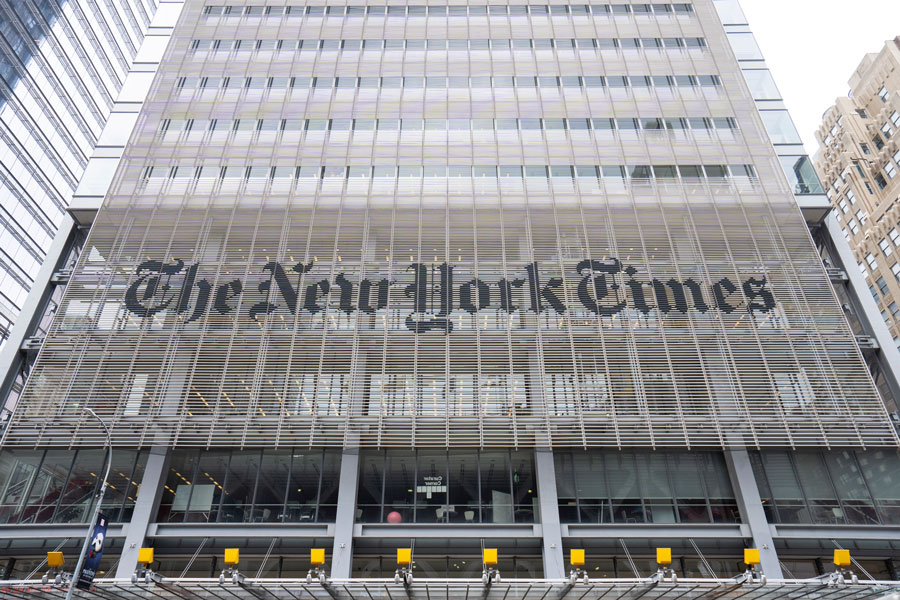Amazon Strikes $25 Million AI Licensing Deal With The New York Times; Pioneering, Multi‑Year AI Licensing Agreement

NEW YORK, NY – In a landmark agreement signaling a major shift in the relationship between big tech and traditional media, Amazon has entered into a multi-year licensing deal with The New York Times, reportedly valued at between $20 million and $25 million annually. The arrangement grants Amazon the rights to use the newspaper’s content to train its artificial intelligence systems.
The agreement, finalized earlier this year but only recently disclosed in financial detail, allows Amazon to access a wide array of Times-owned media. This includes its core news coverage, recipe database from NYT Cooking, and sports journalism from The Athletic. In return, Amazon will integrate portions of this content into products like Alexa, which may use the material to generate summaries, excerpts, or responses to user queries powered by AI.
According to several reports, this deal marks The New York Times’ first official licensing agreement tied to generative AI and also represents Amazon’s first such deal with a major news publisher. The scale and visibility of this partnership are expected to influence how other media companies approach AI-related content sharing and monetization.
The move comes amid growing tension between tech companies and news outlets over the use of journalistic content to train AI models. The New York Times has notably filed a lawsuit against OpenAI and Microsoft, alleging unauthorized use of its reporting to build and enhance their respective AI systems. In contrast, the deal with Amazon represents a more cooperative approach – securing compensation for content while controlling its use through a formal licensing structure.
Industry analysts estimate that the deal represents roughly 1% of The New York Times’ annual revenue, which highlights the increasing value placed on curated, fact-checked journalism in the training and development of AI systems. For Amazon, the deal adds to its ongoing investment in generative AI technologies, especially in enhancing its voice assistant platform and related services.
The arrangement also mirrors a broader trend, as other publishers – including News Corp, Axel Springer, and various European media groups – have struck licensing deals with AI developers such as OpenAI and Google. These partnerships aim to address both the opportunities and the risks of AI’s rapid integration into content creation, curation, and consumption.
By securing this agreement, Amazon positions itself as a player willing to compensate publishers for high-quality content, potentially setting a precedent for future deals across the tech and media landscape.
Why It Matters
- Amazon–NYT entered a pioneering, multi‑year AI licensing agreement in May 2025, allowing use of Times editorial content – including news, recipes, and sports—for AI training and product integration.
- The financial terms—$20M to $25M annually—were first disclosed in late July and represent approximately 1 % of NYT’s 2024 revenue.
- This marks a significant shift in how publishers view AI: NYT is choosing to monetize its content via licensing while pursuing legal action against companies that use it without permission.
- The agreement is a bellwether for other media–tech partnerships as traditional publishers adapt to the evolving AI landscape by claiming value for quality journalism.
Top Questions & Answers About the Amazon–New York Times AI Licensing Deal
Q1: How much is Amazon paying The New York Times for the AI licensing deal?
A: Amazon is reportedly paying between $20 million and $25 million per year under the multi-year agreement. This amount represents approximately 1% of the Times’ annual revenue.
Q2: What does Amazon get access to under this deal?
A: Amazon will receive access to a broad range of content from The New York Times, including its news articles, NYT Cooking recipes, and sports reporting from The Athletic. The content can be used to train Amazon’s AI models and to generate responses through products like Alexa.
Q3: Is this The New York Times’ first AI licensing agreement?
A: Yes. This is the first time the Times has licensed its content for use in training generative AI models, marking a major strategic move into the AI space.
Q4: What will Amazon do with the content?
A: Amazon is expected to use the licensed material to train its proprietary AI systems and to enhance user interactions with Alexa by offering summaries, excerpts, and contextual information sourced from Times content.
Q5: Does this deal affect The New York Times’ lawsuit against OpenAI and Microsoft?
A: No. The Times is still actively pursuing legal action against OpenAI and Microsoft, alleging that they used its content without permission. The Amazon deal, by contrast, is a separate, compensated licensing agreement.
Q6: Why is this deal important for the media industry?
A: It sets a precedent for how media companies can monetize their archives in the AI era. Rather than fighting unauthorized use alone, some outlets are choosing to license content directly to tech companies, establishing formal partnerships.
Q7: Are other media companies making similar deals?
A: Yes. Other major publishers, including News Corp and Axel Springer, have also signed AI content licensing agreements with companies like OpenAI and Google, signaling a broader industry shift.
Q8: How will this impact AI-generated content and voice assistants?
A: Licensing high-quality journalism improves the accuracy and reliability of AI-generated summaries, particularly in platforms like Amazon Alexa. Users may begin to receive more fact-based, curated responses powered by trusted sources.


